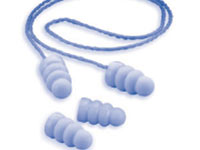|
 |
||
3M 1120/1130 Disposable ear plugs
3M 1120/1130 Disposable ear plugs
DescriptionProductThe 1120 (uncorded) and 1130 (corded) are disposable ear plugs designed for insertion into the ear canal to help reduce exposure to hazardous levels of noise and loud sounds. Key features
ApplicationsThe 1120/1130 is ideal for protection against noise arising from a wide range of applications in the workplace. It is particularly suitable for those with smaller ear canals (eg females) and for those who experience discomfort with existing ear plugs. Examples of typical applications include the following industries: -
Standard & ApprovalThe 1120/1130 are tested to the European Standard EN352-2: 2002 and meet the Basic Safety Requirements as laid out in Annex II of the European Community Directive 89/686EEC. The product has been examined at the design stage by BSI Product Services, Maylands Avenue, Hemel Hempstead, Herts, HP2 4SQ, England (Notified Body number 0086). MaterialsThe following materials are used in the manufacture of this product Ear plugs - Polyurethane Cord - Polyester with acetate tips SizeIn accordance with EN352-2:2002 these ear plugs are in the nominal size range 6 to 12 mm. Fitting Instructions Always wash and rinse your hands before fitting ear plugs. The plugs should be fitted in accordance with the diagrams on the box. 1 Slowly roll down the ear plug between your finger and thumb until it is compressed. 2 While compressed, insert the plug slowly into the ear canal. This is easier if the ear is gently pulled upwards and outwards. 3 Keep the plug in place until it is expanded back to fill the ear canal. 4 Refit the plug if it becomes dislodged through movement
Data
SNR = 34dB H=37dB M=31dB L=27dB APVf(dB)=Mf-sf(dB) Mf = Mean attenuation value sf = Standard deviation H = High-frequency attenuation value (predicted noise level reduction for noise with LC - LA=-2dB) M = Medium-frequency attenuation value (predicted noise level reduction for noise with LC - LA=+2dB) L = Low-frequency attenuation value(predicted noise level reduction for noise with LC - LA=+10dB) SNR = Single Number Rating (the value that is subtracted from the measured C-weighted sound presuure level inside the ear). APVf = Assumed Protection Value |

